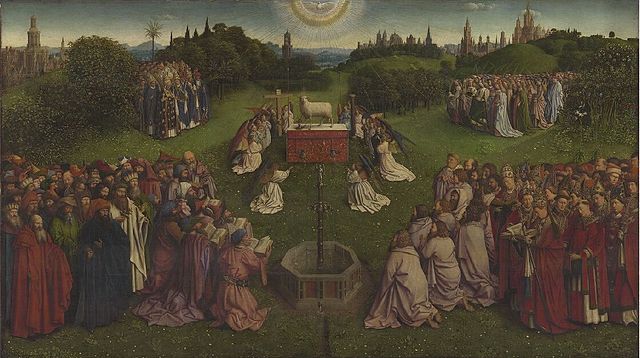When the hour came, he took his place at the table, and the apostles with him. He said to them, ‘I have eagerly desired to eat this Passover with you before I suffer; for I tell you, I will not eat it until it is fulfilled in the kingdom of God.’ Then he took a cup, and after giving thanks he said, ‘Take this and divide it among yourselves; for I tell you that from now on I will not drink of the fruit of the vine until the kingdom of God comes.’ Then he took a loaf of bread, and when he had given thanks, he broke it and gave it to them, saying, ‘This is my body, which is given for you. Do this in remembrance of me.’ And he did the same with the cup after supper, saying, ‘This cup that is poured out for you is the new covenant in my blood. (Luke 22:14-21)
For I received from the Lord what I also handed on to you, that the Lord Jesus on the night when he was betrayed took a loaf of bread, and when he had given thanks, he broke it and said, ‘This is my body that is for you. Do this in remembrance of me.’ In the same way he took the cup also, after supper, saying, ‘This cup is the new covenant in my blood. Do this, as often as you drink it, in remembrance of me.’ For as often as you eat this bread and drink the cup, you proclaim the Lord’s death until he comes.
1And concerning the Eucharist, hold[5] Eucharist thus: The Eucharist 2First concerning the Cup, "We give thanks to thee, our Father, for the Holy Vine of David thy child, which, thou didst make known to us through Jesus thy child; to thee be glory for ever." The Cup 3And concerning the broken Bread: "We give thee thanks, our Father, for the life and knowledge which thou didst make known to us through Jesus thy Child. To thee be glory for ever. 4As this broken bread was scattered upon the mountains, but was brought together and became one, so let thy Church be gathered together from the ends of the earth into thy Kingdom, for thine is the glory and the power through Jesus Christ for ever." 5But let none eat or drink of your Eucharist except those who have been baptised in the Lord's Name. For concerning this also did the Lord say, "Give not that which is holy to the dogs."
This is such an intimate and flexible ritual action that it can sustain, and has sustained, all kinds of practices and interpretations. Christians argue over it relentlessly. In the 16th century, some theological writers started having a problem: if, as John's Gospel suggests, "God is Spirit" and "the flesh accomplishes nothing," how can Christ be really present in the Eucharist? This is a question raised by our Gospel passage for Sunday:
[Jesus said to Nicodemus:] What is born of the flesh is flesh, and what is born of the Spirit is spirit. Do not be astonished that I said to you, “You must be born from above.” The wind blows where it chooses, and you hear the sound of it, but you do not know where it comes from or where it goes. So it is with everyone who is born of the Spirit.’
But then what do we do about all those meals in the Gospels? Why is a meal the central act of the early Church? Is the Sacrament we share today just an empty remembrance of an absent Christ? And if that's so, why would Jesus command us to keep this ritual until his return?
Something else is going on when we gather around the altar--something big and mysterious and sacred that transforms our relationship not just with God but with each other, and not just "spiritually" or in our minds but in our bodies too. Hear more on Sunday!


 RSS Feed
RSS Feed